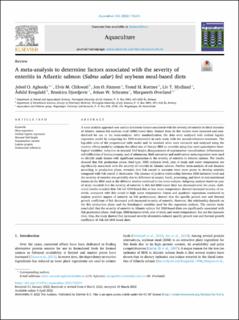| dc.description.abstract | A meta-analytic approach was used to determine factors associated with the severity of enteritis in distal intestine of Atlantic salmon fed soybean meal (SBM)-based diets. Dataset from 26 fish studies were extracted and standardized for use in the meta-analysis. After standardization, the data were analyzed with ordinal logistic regression model by comparing the SBM treatment(s) in each study with the neutral-reference treatment. The log-odds ratio of the proportional odds model and its standard error were extracted and analyzed using the random effects model to estimate the effect size of dietary SBM on enteritis using four semi-quantitative histological variables: reduction in mucosal fold height; disappearance of supranuclear vacuolization; inflammatory cell infiltration of lamina propria, and of submucosa. Both univariate and multivariate meta-regression were used to identify study factors with significant association to the severity of enteritis in Atlantic salmon. The results showed that fish production phase, feed type, SBM inclusion level, year of study and water temperature are significantly associated with the severity of enteritis in Atlantic salmon. Further meta-analysis of sub datasets according to production phase, revealed that fish reared in seawater were more prone to develop enteritis compared with fish reared in freshwater. The absence of positive relationship between SBM inclusion level and the severity of enteritis was probably due to difference in source, batch, processing, and level of anti-nutritional factors in the SBM used in the different studies combined in the meta-analysis. Subgroup analysis based on year of study revealed that the severity of enteritis in fish fed SBM-based diets has decreased over the years. Additional results revealed that fish fed SBM-based diet at low water temperature showed increased severity of enteritis, compared with fish raised in high water temperature. Linear and quadratic regressions conducted to explore possible impact of enteritis on fish performance, showed that the specific growth rate and thermal growth coefficient of fish decreased with increased severity of enteritis. However, this relationship depends on the fish production phase and the histological variables used for the regression analysis. The current study concluded that the severity of enteritis in Atlantic salmon fed SBM-based diets are significantly associated with fish production phase, feed type, SBM inclusion level, year of study and water temperature, but not the exposure time. Also, the study showed that increased severity of enteritis reduced specific growth rate and thermal growth coefficient of fish fed SBM-based diets. | |
